人教版中考各册复习七下Unit 4-6复习学案
七年级英语下册4-6复习学案
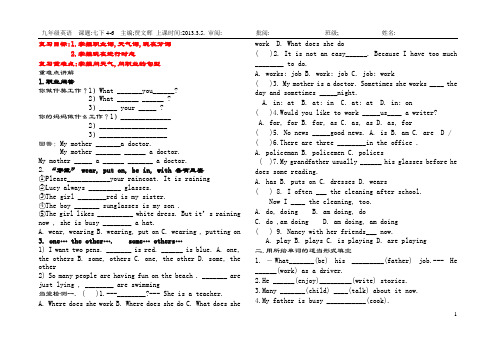
复习目标:1.掌握职业词,天气词,现在分词2.掌握现在进行时态复习重难点:掌握问天气,问职业的句型重难点讲解1.职业问答你做什莫工作?1)What _______you______?2)What ______ ______ ?3)_____ your _____ ?你的妈妈做什么工作?1)______________2)___________________3)___________________回答:My mother _______a doctor.My mother _______ ______ a doctor.My mother _____ a ______ _______ a doctor.2.“穿戴” wear, put on, be in, with 各有风姿○1Please____________your raincoat. It is raining○2Lucy always _________ glasses.○3The girl ________red is my sister.○4The boy _______ sunglasses is my son .○5The girl likes __________ white dress. But it’s raining now , she is busy ________ a hat.A. wear, wearingB. wearing, put onC. wearing , putting on3. one… the other…. some… others…1) I want two pens. _______ is red. ______ is blue. A. one, the others B. some, others C. one, the other D. some, the other2) So many people are having fun on the beach . _______ are just lying , ________ are swimming当堂检测一. ( )1.---________?--- She is a teacher. A. Where does she work B. Where does she do C. What does she work D. What does she do( )2. It is not an easy______. Because I have too much________ to do.A. works; jobB. work; jobC. job; work( )3. My mother is a doctor. Sometimes she works ____ theday and sometimes _____night.A. in; atB. at; inC. at; atD. in; on ( )4.Would you like to work _____us____ a writer?A. for, forB. for, asC. as, asD. as, for( )5. No news _____good news. A. is B. am C. are D /( )6.There are three ________in the office .A. policemanB. policemenC. polices( )7.My grandfather usually ______ his glasses before hedoes some reading.A. hasB. puts onC. dressesD. wears ( ) 8. I often ___ the cleaning after school.Now I ____ the cleaning, too.A. do, doingB. am doing, doC. do ,am doingD. am doing, am doing( ) 9. Nancy with her friends___ now.A. playB. playsC. is playingD. are playing二.用所给单词的适当形式填空1.—What_______(be) his _________(father) job.--- He______(work) as a driver.2.He ______(enjoy)_________(write) stories.3.Many _______(child) ____(talk) about it now.4.My father is busy ___________(cook).15.It is a _________(rain) day today.6.________ it often _______ (rain)in summer?7. It’s kind of hot because it’s __ (sun).8. One of us _________ (take) photos for them now.9. Thank you for _______(join) our show.10.Mary_____________ (not sleep).She is out.三.句型转换 1. My mother works at a TV station._______ ________ ________ mother _______?2.His uncle is a bank clerk._________ _______ his uncle _______? =_______ his _______ _______?3..My brother gives me some money.=My brother ______ some money _____ _____.=I get some money ______ my brother.4.He swims in the pool. (改为进行时)He _______ _______ in the pool.5.. The students are cleaning the room.________ ________ the students __________?6.It’s very cold today. (提问) ______ is the ______ today?四.翻译1.她总是外出吃饭。
七(下)第四单元复习导学案一.doc

七(下)第四单元复习导学案一七(下)第四单元复习导学案一【学习目标】1.接触动物世界,了解一些动物,激发关爱保护野生动物的热情。
2.感受课文中准确的说明、生动形象、细致的描写,学习准确、生动的语言。
3.充分利用注释和工具书理解词句,疏通文意,深入领会文章寓意。
4.学习观察动物的特点,并能向别人介绍,培养仔细观察动物的习惯。
5.积极参加保护野生动物的活动,增强保护野生动物的意识并进行社会宣传。
【课时】8课时第一课时.积累词语。
1.重点词语。
矫(ji5o)健榛(zhen)子蛰(zh6)伏苔莓(tdixian) 褐色(he)驯(xtm)良乖(gudi)巧帽缨(yI ng) 玲珑(llnglonh) 圆锥(zhui)形玩耍(shua)铁锹(qido)上领(仓)一抹(mb)余辉炫(xu dn)耀献媚(m以)蠡(zhOng)斯近在咫(zhi)尺斑(ban)点鞘(qido)翅瞌(蛇)睡抑郁(yi yti) 天赋(fti) 豌(wan)豆繁殖(zhl)产卵(luan) 无动于衷(zhong) 企鹅(6) 憨(hdn)态可掬⑪)濒(bin)危上林苑(yuan)邛峡(qi6ngldi)笨拙(zhud)栖(qi)息分娩(mi an)翌(yi)H 拯(zhEng)救繁衍(yan) 嬉(xi)戏晚餐(cdn) 喇(1日)叭身躯(qU) 璀璨(cuican)浩瀚(hdn) 孤僻(pi) 黔(qidn)之驴大骇(hdi) 远遁(dun) 益狎(xid) 跳踉(lid ng) 噬(shi)己大(han) 垂绥(nd) 庶鸟鹄(zh仓gU) 乍(zhd)闻藉(ji仓)秋风不饮啄(zhud) 锦翼(yi) 鸣噪(zdo) 敬mi)猴拖男挈(qi仓)女碣(ji6)石嗟眼)叹骁(xido)雄悭(qidnlin)吝咄咄(du。
)掣(ch仓)肘瞑(mlng)目奇葩(pd) 山巅(didn) 麒麟(qilin)潺浸(chdnyudn)须臾(yii)2.多音多义字。
人教版七年级下册Unit 4-Unit 6【复习课件】中考英语一轮大单元复习(人教版)

6.——你为什么喜欢狗? ——因为它们挺有趣的。 —Why do you like dogs ? — Because they're kind of interesting .
7.我喜欢狗因为它们既友好又聪明。 like dogs because they're friendly and smart . 8.大象是泰国的一种象征。 The elephant is one of Thailand's symbols .
上一页 返回导航 下一页
2.save vv..节 储省 存; ;省 储去 蓄 v.救;救助 例:Please save water.请节约用水。(v.) He managed to save enough money to buy a small house.他想办 法攒了足够的钱买了座小房子。(v.) She saved a little girl from the fire.她从火中救了一个小女孩。 (v.)
上一页 返回导航 下一页
4.luck(n.)→ lucky (adj.)运气好的;侥幸的★ → luckily (adv.)幸运地;好运地 → unluckily (adv.)不幸地★ ▲bring good luck to … 给……带来好运 5.south(n.)→ southern (adj.)南方的;南部的★ 6.forget(v.)→ forgot (过去式)★ → forgotten (过去分词)忘记;遗忘;忘掉 → forgetful (adj.)健忘的★
上一页 返回导航 下一页
7.feel(v.)→ felt (过去式/过去分词)摸;触;感觉;觉得;摸起 来★ → feeling (n.)感觉;感情★ ▲feel like doing sth.想要做某事 8.noise(n.)→ noisy (adj.)吵闹的★ ▲make a noise 制造噪音 9.danger(n.)→ dangerous (adj.)危险的★ ▲be in (great) danger 处于(极大)危险之中
人教版七年级下册第四单元复习导学案
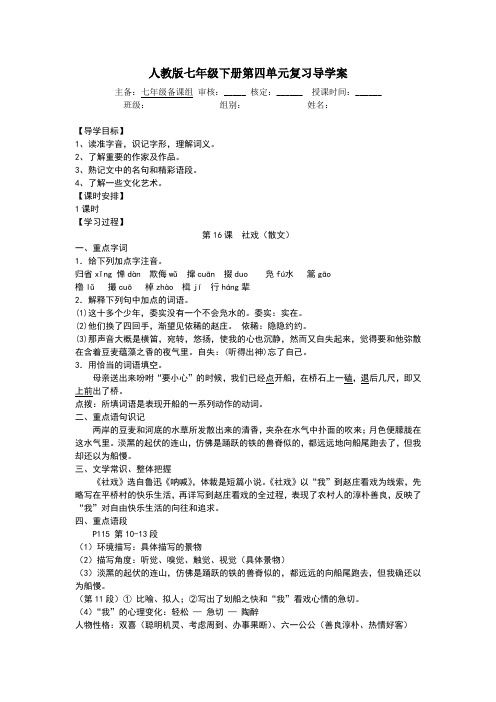
人教版七年级下册第四单元复习导学案主备:七年级备课组审核:_____ 核定:______ 授课时间:______班级:______________ 组别:__________ 姓名:_________【导学目标】1、读准字音,识记字形,理解词义。
2、了解重要的作家及作品。
3、熟记文中的名句和精彩语段。
4、了解一些文化艺术。
【课时安排】1课时【学习过程】第16课社戏(散文)一、重点字词1.给下列加点字注音。
归省xǐng 惮dàn 欺侮wǔ撺cuān 掇duo 凫fú水篙gāo橹lǔ撮cuō棹zhào 楫jí行háng辈2.解释下列句中加点的词语。
(1)这十多个少年,委实没有一个不会凫水的。
委实:实在。
(2)他们换了四回手,渐望见依稀的赵庄。
依稀:隐隐约约。
(3)那声音大概是横笛,宛转,悠扬,使我的心也沉静,然而又自失起来,觉得要和他弥散在含着豆麦蕴藻之香的夜气里。
自失:(听得出神)忘了自己。
3.用恰当的词语填空。
母亲送出来吩咐“要小心”的时候,我们已经点开船,在桥石上一磕,退后几尺,即又上前出了桥。
点拨:所填词语是表现开船的一系列动作的动词。
二、重点语句识记两岸的豆麦和河底的水草所发散出来的清香,夹杂在水气中扑面的吹来;月色便朦胧在这水气里。
淡黑的起伏的连山,仿佛是踊跃的铁的兽脊似的,都远远地向船尾跑去了,但我却还以为船慢。
三、文学常识、整体把握《社戏》选自鲁迅《呐喊》,体裁是短篇小说。
《社戏》以“我”到赵庄看戏为线索,先略写在平桥村的快乐生活,再详写到赵庄看戏的全过程,表现了农村人的淳朴善良,反映了“我”对自由快乐生活的向往和追求。
四、重点语段P115 第10-13段(1)环境描写:具体描写的景物(2)描写角度:听觉、嗅觉、触觉、视觉(具体景物)(3)淡黑的起伏的连山,仿佛是踊跃的铁的兽脊似的,都远远的向船尾跑去,但我确还以为船慢。
(第11段)①比喻、拟人;②写出了划船之快和“我”看戏心情的急切。
初中英语_初三复习课七年级下units4-6教学设计学情分析教材分析课后反思
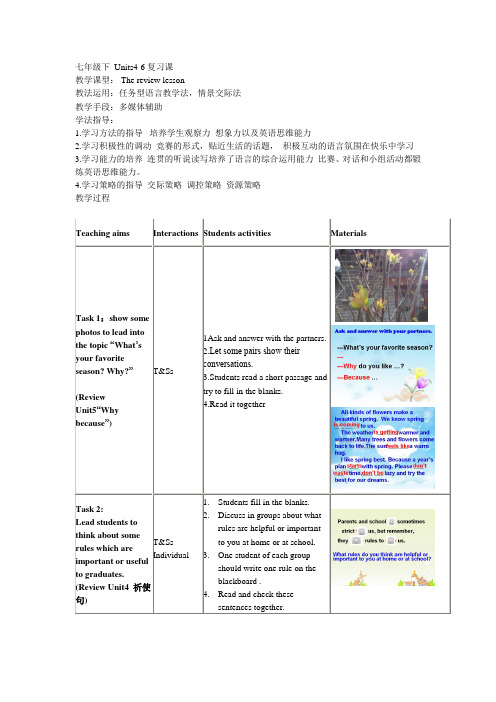
七年级下Units4-6复习课教学课型: The review lesson教法运用:任务型语言教学法,情景交际法教学手段:多媒体辅助学法指导:1.学习方法的指导培养学生观察力想象力以及英语思维能力2.学习积极性的调动竞赛的形式,贴近生活的话题,积极互动的语言氛围在快乐中学习3.学习能力的培养连贯的听说读写培养了语言的综合运用能力比赛、对话和小组活动都锻炼英语思维能力。
4.学习策略的指导交际策略调控策略资源策略教学过程Teaching aims Interactions Students activities MaterialsTask 1:show somephotos to lead intothe topic “What’syour favoriteseason? Why?”(ReviewUnit5“Why because”)T&Ss1Ask and answer with the partners.2.Let some pairs show theirconversations.3.Students read a short passage andtry to fill in the blanks.4.Read it togetherTask 2:Lead students tothink about some rules which are important or useful to graduates. (Review Unit4 祈使句) T&SsIndividual1.Students fill in the blanks.2.Discuss in groups about whatrules are helpful or importantto you at home or at school.3.One student of each groupshould write one rule on theblackboard .4.Read and check thesesentences together.Task3: Do someexercises.T&Ss1.choose the phrases and use thecorrect forms.2.translate the sentences.3.中考链接Task4:Make a post andwrite a proposalabout theenvironmentalprotection.(Review 现在进行时, 综合写作)T&SsIndividual1.Look at the picture and fill inthe blanks . Talk about whatare people doing some wrongthings to the earth.2.Discuss in groups:What are the problems?What caused them?How can we solve them?3.Write an article as aproposal ,using the importantlanguage point.4.Choose several students toshow and read their articles tothe class.Homework.. 1.Exchange the articles and correctsome mistakes.2.Do the exercise.学情分析:初三学生已经学完五册课本,经过三年的学习与积累已经有了一定的知识储备和思想完善,已初步具备了综合运用语言的能力。
七下册Unit-4-复习导学案
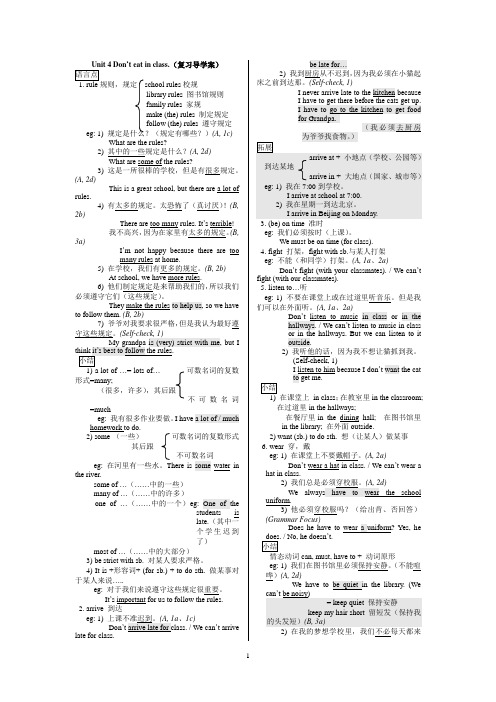
’t eat in class.(复习导学案)规则,规定school rules校规library rules 图书馆规则family rules 家规make (the) rules 制定规定follow (the) rules 遵守规定eg: 1) 规定是什么?(规定有哪些?)(A, 1c)What are the rules?2) 其中的一些规定是什么?(A, 2d)What are some of the rules?3) 这是一所很棒的学校,但是有很多规定。
(A, 2d)This is a great school, but there are a lot ofrules.4) 有太多的规定。
太恐怖了(真讨厌)!(B,2b)There are too many rules. It’s terrible!我不高兴,因为在家里有太多的规定。
(B,3a)I’m not happy because there are toomany rules at home.5) 在学校,我们有更多的规定。
(B, 2b)At school, we have more rules.6) 他们制定规定是来帮助我们的,所以我们to follow them.7) 爷爷对我要求很严格,但是我认为最好遵形式=many;(很多,许多),其后跟不可数名词=mucheg: 我有很多作业要做。
I have a lot of / muchhomework to do.2) some (一些)可数名词的复数形式其后跟不可数名词eg: 在河里有一些水。
There is some water inthe river.some of …(……中的一些)many of …(……中的许多)one of …(……中的一个)eg: One of thestudents islate.(其中一个学生迟到了)most of …(……中的大部分)3) be strict with sb. 对某人要求严格。
中考英语(人教新目标)一轮复习方案第一部分 第4课时 七年级下册 Unit 4~Unit 6

基础自查
考点汇聚
随堂演练
课后作业
9.in_class 在课堂上 10.go_to_bed 上床睡觉 11.think_about 考虑 12.have_to 必须;不得不 13.good_luck 好运 14.be_from/come_from 来自…… 15.kind_of 稍微;有点儿 16.be in (great) danger 处于(极大)危险之中
基础自查
考点汇聚
随堂演练
课后作业
5.人们砍倒许多树因此大象正在失去它们的家园。 People ________ ________ many trees so ________ are ________ their homes.
答案:cut down; elephants; losing
基础自查
考点汇聚
随堂演练
课后作业
谈论规矩 1.—____________________________________________________? (他必须在学校穿校服吗?) —Yes, he does./No, he doesn't.
答案:Does he have to wear a uniform at school
基础自查
考点汇聚
随堂演练
课后作业
其他 1.hair (n.) 头发;毛发 2.flag (n.) 旗;旗帜 3.tomorrow (adv.) 在明天 (n.) 明天;未来 4.race (n.) 竞赛 5.state (n.) 州
基础自查
考点汇聚
随堂演练
课后作业
1.go_out 外出(娱乐) 2.go_to_the_movies 去电影院 3.get_lost 迷路 4.drink_tea 喝茶 5.make_rules 制定规则 6.make_one's_bed 铺床 7.be_strict_(with_sb.) (对某人)要求严格 8.be_late_for 迟到
2021中考人教版七年级英语下册下Units4-6复习课件

② hear sb. doing sth. 表示“听到某人正在做某 事”。如:
I heard a girl reading a poem next door. 我听见 一个女孩正在隔壁房间读一首诗。 ③ be heard to do sth. 表示“被听到做某事”,为
被动语态。如:
He was always heard to cry in his bedroom. 经
【满分点拨】
keep
keep+ sb./sth.+宾语补足语(形容词、副 词或介词短语)使……保持某种状态
keep +sb. doing sth.让某人一直做某事
keep +adj.保持…… 保留,保存
如: You must keep the classroom clean. 你们必 须保持教室净。
房间。(Unit 6 P33)
考点十三 辨析read, watch, look与see I’m reading a book.我正在读书。(Unit 6 P33)
考点十四 辨析other, the other, another, others 与the others
...So it’s like any other night for Zhu Hui and his family.……因此对于朱辉和他的家人来说,它 像任何一个夜晚。(Unit 6 P35)
和学校有时是严格的……(Unit 4 P23)
【考点抢测】
3.The coach is strict ____A____ training.
A.in
B. at C. of
D. with
【满分点拨】
strict adj.
be strict with sb.对某人要求严格 be strict in sth.对某事要求严格
七年级下册 Unit 4--6 复习课件 2024届九年级中考人教版英语一轮复习

语法关
祈使句(Unit 4) 祈使句常用来表示请求、命令、劝说、号召、警告等。 祈使句的主语一般是第二人称you,但往往省略,句末通常用 句号或感叹号。 有时为了表示委婉的语气,可在句首或句尾加上please。
形式
结构
例句
肯定 动词原形+其他 形式 Let+宾语+动词原形
Take out the rubbish. Let her play the piano.
A. take up
B. look for
C. cut up
2) We should stop _____C____ trees. A. carrying out B. working out C. cutting down D. handing out
7. other adj. 另外的;其他的 pron. 另外的人(或物)
中考复习
七年级下册 UNIT 4---6
词汇关
1. listen v. 听;倾听 listen to 听……
listen/hear
listen vi. 强调“听”的动作,后面不能直接跟宾语。
强调“听”的结果。 hear sb. do sth. 听见某人做某事
七下units4-6复习 教学设计

人教版七年级下Units 4-6复习教学设计Teaching aims1.Review the key phrases and the target language of units 4-6.2.Master Present Progressive Tense, Imperative Sentences and Wh- questions.Teaching key points and difficultiesPresent Progressive Tense, Imperative Sentences and Wh- questions. Teaching stepsStep 1: Warming upLook at some prohibitory signs and talk about their meanings, which can lead in the topic of Imperative Sentences.Step 2: Review and ability enhancementPart one1. Free talk. We can’t live with out standards, ask students to cooperate in pairs and talk about some of the rules around us, such as family rules, school rules, library rules and so on. Choose three aspects and think of at least three rules for each, group A can write down some if necessary.2. Listening practice. Listen to the conversation and choose the right answers. (P20 2d)3. Present a picture of the classroom and ask students what they are doing and what rules they are breaking to lead into the topic of the Present Progressive Tense as well.4. Work in pairs and talk about your dream school using the following patterns: “At our school, we have to/must... At my dream school, wecan/should/are supposed to...”with the purpose of reviewing the Modal verbs.5. Grammar explanations of Imperative Sentences.Part two1. Show some illegal behavior pictures in the zoo. Ask students what the people are doing to lead in the sentence pattern “be doing”. At the same time, call on everyone to protect the animals.2. Drill the wh- questions.3. Listen and fill in the chart. (p29 2b)4. Guessing games. Show some covered pictures and guess what they are doing, the following sentence pattern can be used: “He/she must/could/might be doing...” and “he/she is doing...” after unfolding them.5. Show some pictures and ask students to describe what the people in the pictures are doing now, group A can write down some sentences.6. Listen and answer the questions. (p34 1c)7. Grammar explanations of the Present Progressive Tense.Step 3: Exercises and consolidation1. Recite and check some key phrases.2. Group B finish the exercises on the paper and then check for each other. Group B recite the key points before doing some of the exercises if necessary.3. Check the answers and explanation of several difficult points.Step 4: Homework。
七年级下英语4-6单元知识复习导学案

Keep sb /sth doing sth让某人某物不断做某事
Keep on doing sth持续不断做某事
Keep sb /sth from doing sth。阻止/防止某人某物做某事。
2.生记笔记并记忆。
3.生完成练习:
内容:P:31考点5 T 18-23
科目
英语
课题
七下4-6单元知识复习
授课老师
班级
上课时间
签审领导
节次
学习目标及重难点
1.学习too much, too many, much too的区别并能正确运用。(难)
2.学习并掌握keep.用法。(重)
一、复习Review
复习上节课所学内容
(Remember.及相关短语的用法——连麦抽查学生)
其他同学抄写知识2遍
2、P28页1-5题.3、作业完成后拍照发钉钉。
时间:6分钟。
要求:①独自完成,认真审题,画出重点。
②.完成后及时回复老师。
4. 核对答案,先连麦学生讲解,后师讲解补充。
5生改错并自主记忆。
三、练习Exercise
1.学生背诵4-6单元重点知识:考点①——⑤
2. 如果时间允许可连麦抽查3位同学,时间不够抽查1位。
四、作业Homework
1、前10名同学背诵默写知识点
二、新授Presentation
知识点一:too many too much, much too.的区别
1.师讲解、归纳too many:太多,饰可数名词复数。中心词为many.
too much: 太多修饰不可数名词。也可修饰动词作状语。
中心词为much。
人教版七年级英语下册4-6单元教案

①不要在楼道里跑。_______________________
②不要打架。____________________
③有什么规则?___________________
④我们必须按时上课。____________________
⑤我们可以在教室里吃东西吗?____________________
Don’t open your books. Don’t talk. Let’s begin our class.
学生听教师的指令完成各种动作,教师也可将指令写到黑板上,让学生从视觉上考察祈使句的特点。
迅速吸引学生的注意力
2. Presentation
教师出示书上1a的图片,向学生提问。
指着图上奔跑的男孩提问
Ss listen to the recording and check the activities they hear.
Listen to the recording again.. Check the answers:
听力实践,从对话中获取信息。
7. Pair work
1. Suppose you are Alan and your partner is Cindy. Talk about the rules in 2a.
some students come to the front and act out the conversations.
组织Pair work,学生扮演角色模仿上述会话
8. Role-play
1. Read the conversation and find some rules in this school?
人教版七年级英语下册《Unit4第六课时》学案

Unit4 Don’t eat in class.第六课时Section B 3a - Self Check (写作课)学案Teaching Goals:一、功能:Talk about rules.Don’t run in the hallways.Can we eat in the classroom?We must be on time for class.What does he have to do?二、词汇和常用表达:Learn to use can ,have to, must and the useful expressions( What do you have to do? What can I do?etc.)三、学习策略:学会运用空间逻辑顺序拟定写作提纲,通过小组互助提高写作技巧和能力。
四、文化知识:No rules no standards!(没有规矩不成方圆!)(目标引领:从功能、词汇和常用表达学习策略及文化知识四个方面阐述了本节课的教学目标,层次清晰,一目了然。
)Teaching and learning steps:Step1. Pre-writing activities1. Revision(话题复习):Task 1 Talk about school rules:First, write down on the line. Then talk about it in pairs.1._____________________________________2.________________________________________3._______________________________________4.________________________________________5.________________________________________Task 2 Talk about family rules.First, ask and answer in pairs. Then write it down on the line.Task 3 Make sentence.Use can, can’t, have to/must and don’t to write about the rules at school.(Self check 2)1.arrive late/class _____________________________________2.listen/teacher ______________________________________3.be noisy/library _________________________________4.speak English/English class __________________________5.eat/dinning hall __________________________________【设计意图】坚持“以生为本,先学后教”的理念,强调学生的参与、体验、感知,落实基本语言点,以学定教,教师根据具体学情适当微调后续环节的教法。
人教版七年级下册英语unit 4 复习学案
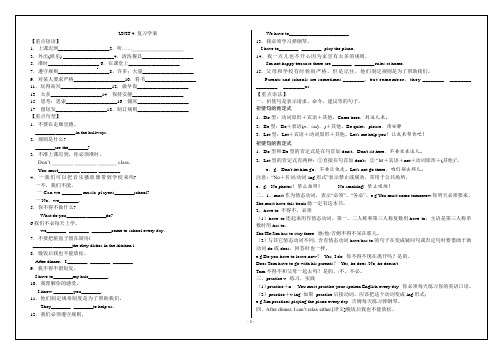
15 .思考:思索____________________16 .铺床____________________
17 .留短发____________________18.制订规则____________________
1.These foreigners are practicingChinese.
A.to speakB.speakingC.speakD.speaks
2.For our safety, we mustthe traffic rules on the way to school.
A.followB.changeC.makeD.break
I have to_________ _________play the piano.
14.我一点儿也不开心因为家里有太多的规则。
I'm not happy because there are_________ _________rules at home.
15.父母和学校有时候很严格,但是记住,他们制定规则是为了帮助我们。
[译文]父母和学校有时候是很严格,但是记住,他们制定规则是为了帮助我们。
(1)strict adj.严格的
be strict with sb.对某人严格be strict in sth.对某事严格
e.g.Father is strict with us.父亲对我们很严格。He is strict in his work.他对工作很严格。
2. Don’t(打架)with others.
3.Don’t run in the hallways . It’s(危险)。
人教版七年级下册 Units 4--6 综合复习 (共130张PPT)

44. ___c_h_i_ld______ n. 儿童 →__c_h_il_d_r_e_n___ 复数
45. ___y_o_u_n_g_____ adj. 幼小的;年轻的 →__o_l_d_______ adj. 老的(反义词)
6. What do / does ... have to do? ……不得不做什么?
7. —Why do you like ...? —Because ... —你(们)为什么喜欢……? —因为……
8. Where is / are ... from? ……来自哪儿?
9. What is / are ... doing? ……正在干什么?
10. We want to do ... 我们想做……
1. arrive v. 到达 【归纳】
arrive in+相对较大的地方 arrive in Beijing
arrive arrive at+相对较小的地方
arrive at the station
get/reach/arrive
arrive 其后若跟地点名词, vi. 需要借助于介词in或
at。
get vi. get to + 地点
后面接here, there, home等表 示地点的副词时, 省略介词。
7. _b_e__s_tr_i_c_t _w_i_th__s_b_.__ 对某人要求严格 8. _b_r_i_n_g_s_t_h_._t_o_s_o_m__e_p_l_a_c_e 把某物带到某地 9. _c_u_t_d__o_w_n________ 砍倒 10. _d_o_t_h_e__d_is_h_e_s_____ 清洗餐具 11. _D_r_a_g_o_n__B_o_a_t_F__es_t_iv_a_l___ 端午节 12. _d_r_in_k__t_e_a________ 喝茶 13. _e_a_t_o_u_t__________ 出去吃饭
人教版中考英语一轮复习复习学案七年级下册Units4~6

Grade 7 下(Unit 4--Unit 6)【复习目标】Main Topic: rules ( U4 ), animals in the zoo (U5), everyday activities (U6 ) 规则,动物园的动物,日常活动Main Functions :talk about rules, describe animals, express preference, and talk about what people are doing 谈论规则,描述动物,表达偏好,谈论人们正在做的事Grammar:imperatives (Don’t), can for permission, modal verbs (must, have to), why/ what/ where questions, present progressive tense参考《滚动迁移》:祈使句/否定祈使句(P191),情态动词(must/have to)(P207),why/ what/ where特殊疑问句(P41)【Before class】【课前自主探究复习】Independent Review:单词变形:noise n.→_______ adj.1.luck n.→_______ adj.幸运的→______ adv.→_______ adj.不幸的→_______ adv.2.Australia n.→_______adj3.Africa n.→_______adj.4.America n.→_______adj.5.danger n.→_______ adj.6.important adj.→_______ n.7.quiet adj.→__________ adv.8.shy adj.→ ______ n.重点短语:关于keep的短语➢keep (sb./sth) adj __________ 例:Lisa believes that good eating habits help her keep healthy.➢keep (sb./sth) doing __________ 例:It is harmful for you to keep your eyes working for a long time.➢keep on doing __________ 例:The Chinese government still keeps on fighting against COVID-19.➢keep (sb./sth) from doing __________ 例:The parents must keep the children from playing with the smart phone as itharms their brains and their eyesight.➢keep sth. to oneself __________ 例:I am expected to keep my friend's secret to myself用括号中所给单词的适当形式填空。
- 1、下载文档前请自行甄别文档内容的完整性,平台不提供额外的编辑、内容补充、找答案等附加服务。
- 2、"仅部分预览"的文档,不可在线预览部分如存在完整性等问题,可反馈申请退款(可完整预览的文档不适用该条件!)。
- 3、如文档侵犯您的权益,请联系客服反馈,我们会尽快为您处理(人工客服工作时间:9:00-18:30)。
Unit 4 I want to be an actor.一.短语:1 ________________想要作某事2 ________________ = ________________给某人某物/ 把某物给某人3 _________帮助某人作某事Eg: I want to help my mother __ some housework at home.4 _________帮助某人谋事Eg: I want to help my mother with some housework at home5 in the day 在白天6 at night 在晚上7 talk with/ to sb 和----谈话8________________忙于做某事Eg: He is busy listening to the teacher.9 __________在医院10 work/ study hard 努力工作11 Evening Newspaper 晚报二.重点句式及注意事项:1 询问职业的特殊疑问词是what;有三种主要句式①________________? Eg. What is your mother?②________________________? Eg. What does his brother do?③________________________________? Eg . what is your job?2 People give me their money or get their money from me.3 Sometimes I work in the day and sometimes at night.4 I like talking to people.5 I work late. I’m very busy when people go out to dinners.6 Where does your sister work?7 then we have a job for you as a waiter.8 Do you want to work for a m________? Then come and work for us as a reporter.9 Do you like to work evenings and weekends?10 We are an ________________ school for children of 5-12.三.本单元中的名词复数。
1 policeman--________2 woman doctor--________ ________3 thief--________4.apple tree--________ ________Unit 5 I’m watching TV一.现在进行时Ⅰ现在进行时的用法表示现在(说话瞬间)正在进行或发生的动作Ⅱ现在进行时时间状语及标志性词○1now 现在○2at the momen t现在○3look 看(后面有明显的“!”)○4listen 听(后面有明显的“!”)Ⅲ现在分词的构成①一般在动词结尾处加ing Eg: go—going look--looking②以不发音字母e结尾的动词,去e加ing。
Eg: write—________close--________③以重读闭音节结尾的动词,如果末尾只有一个辅音字母,应先双写这个字母,再加ing.Eg: get—________ run—________ ( swim, run, put,get,sit,begin)Ⅳ现在进行时的构成肯定句: 主语+ am/is/are+ doing +其他+时状. Eg: He is doing his homework now.否定句:主语+am/is/are +not+ doing+其他+时状. Eg: He is not doing his homework now.一般疑问句:Am/Is/Are +主语+ doing+其他+时状?Eg: Is he doing his homework now?肯定回答:Y es,主语+________Eg Y es, he is.否定回答:No, 主语+________________Eg: No, he isn’t.二.短语:1.________________做某人的作业________________做家务2.____________在电话里交谈,________……谈论……________和某人交谈3.________写信________给某人写信4.________……和……一起玩5.________看电视TV show 电视节目6.________sb/sth 等待某人/某物7.some of…………中的一些8.in the first photo 在第一张照片里(介词用in,序数词前面有the)in the last photo 在最后一张照片里 a photo of one’s family 某人的家庭照片9.at the mall 在购物街at/in the ________在图书室at/in the pool 在游泳池10.read a book = read books = do some reading看书\阅读11.________ ________= thank you for为某事而感谢(后接动词要用v-ing)三.重点句式及注意事项:1.他正在干什么?________________? 他正在吃饭。
________________.他正在哪里吃饭?________________他正在家里吃饭。
________________.2.你想什么时候去?_____________? 让我们六点钟去吧。
____________.3.他正在等什么?_______________? 他正在等公交车。
_______________。
4.他们正在和谁说话?________________________?他们正在和Miss Wu说话。
________________.5.你们正在谈论什么?________________________?我们正在谈论天气。
________________________.6.他们都正在去上学。
________________________.7.这儿是一些我的照片。
________________________.这儿是一些肉。
Here is some of meat.(some of meat不可数,故用is)8.谢谢你帮我买这本书。
Thank you for ________ me buy this book.9.family 家;家庭。
强调“整体”,是单数;强调“成员”时,是复数。
His family ________ a shower. 他们家有一个淋浴。
His family ________ watching TV. 他全家在看电视。
Unit 6 It’s raining!一.短语:1________________照像 2 take photos/ pictures of sb/ sth给某人或某物照相3 have a good time\have fun\have a great tame 玩得愉快4 work for sb / sth为某人工作Eg: Y uan Y uan works for CCTV’s Around The World show5 on vacation度假Eg: There are many people here on vacation.6 ______…______…一些…另外一些…______…______…一个…另一个…(两者之间)Eg: There are many students in the classroom. Some are writing, others are reading.7 ________穿上(动作)________穿着(状态)Eg: Tom is putting on his coat now.8 on the beach在沙滩上Eg: Tom and his family are playing on the beach at this moment.9 this group of people这一群人10. in this heat二.重点句型1.________________/________________? 天气怎么样?It’s raining. 在下雨。
2.________________? 你正在做什么?________________________. 我在看电视。
3._____________________? 他们在做什么?____________________. 他们在学习。
4.______________________? 他在做什么?______________________. 他在打篮球。
5.________________________? 她在做什么?________________________ . 她在做饭。
三.重难点解析1、询问天气情况的句式:(横线内容可替换)①How is the weather in Beijing? (How is the weather today?)②What’s the weather like in Beijing? ( What’s the weather like today?)2、回答上面问题的句式:①It’s + adj. (形容词) Eg: It’s windy.3 、How’s it going (with you)?①Not bad. ②Great! ③Terrible!④Pretty good.4、Thank you for joining CCTV’s Around The Word show.5、I am surprised they can play in this heat.6、Everyone is having a good time.7、People are wear ing hats and scarfs.①wear 指穿衣服的状态。
②put on 指穿衣服的动作。
Please put on your old clothes四.谈论天气的日常用语1. It’s _____/_____/_____. 今天是晴天/雨天/阴天。
2. Lovely weather,isn’t it? 天气真好,是吗?3. It looks like rain. 看起来要下雨。
